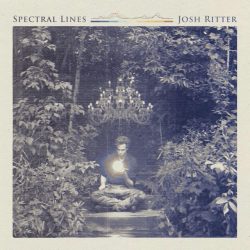A reflective and atmospheric 11th studio album that finds Ritter exploring a broader musical palette.
 Being fully aware of stating the obvious a lot has changed since Josh Ritter’s last album, 2019’s ‘Fever Break’ delivered its ten songs full of politicised angst and indignation at the unnerving events that were unfolding in his native U.S.A. Produced by Jason Isbell and with the full support of his band the 400 Unit, ‘Fever Break’ rocked, full of muscle and bite that perfectly suited the acute lyrical narrative of the subject matter that Ritter had generally chosen to avoid throughout his twenty-year career. Many of those changes have been played out on the global stage for all to witness but other changes are more personal and for Ritter the recent loss of his mother, to whom this new album is partly dedicated, has understandably been a major factor in the contrast, lyrically and musically, that the new album has from its predecessor.
Being fully aware of stating the obvious a lot has changed since Josh Ritter’s last album, 2019’s ‘Fever Break’ delivered its ten songs full of politicised angst and indignation at the unnerving events that were unfolding in his native U.S.A. Produced by Jason Isbell and with the full support of his band the 400 Unit, ‘Fever Break’ rocked, full of muscle and bite that perfectly suited the acute lyrical narrative of the subject matter that Ritter had generally chosen to avoid throughout his twenty-year career. Many of those changes have been played out on the global stage for all to witness but other changes are more personal and for Ritter the recent loss of his mother, to whom this new album is partly dedicated, has understandably been a major factor in the contrast, lyrically and musically, that the new album has from its predecessor.
‘Spectral Lines’ finds Ritter returning to Sam Kassirer for production duties having seen him first take that role on ‘The Historical Conquest Of Josh Ritter’ (2007) and most recently on ‘The Beast In Its Tracks’ (2013), and in many ways this new album feels as much Kassirer’s as it does Ritter’s such is the impact of the musical arrangement across each of the ten songs. Gone are the traditional instruments of mandolin, accordion and fiddle to be replaced by mellotron, synthesisers and organ, while even the guitars that so often played the leading role are now relegated to simply supplying the tension through occasional jagged and distorted chords. In truth it’s uncertain whether the lyrical narrative dictates the ambient arrangement or whether the atmospheric production is a deliberate attempt to match the reflective poetry from the master wordsmith that Ritter has undoubtedly proved himself to be, but in the most parts it works, though fans of Ritter’s previous albums may require a few listens to feel totally comfortable with the new sound.
The album’s opener ‘Sawgrass’ immediately sets the tone, with its sparse intro quickly joined by Ritter’s spoken-sung delivery reminiscent of latter-day Leonard Cohan or even Bob Dylan, full of distant reflection and hard-won sagacity. The mood is sombre but never maudlin as he addresses his own mortality with a gentle defiance “If heaven’s waiting, heaven can wait”. This is followed by the single ‘Honey I Do’ that ups the tempo with a song of hope for those who feel all hope is lost. Kassirir’s choice of production sees each track seamlessly bleed into the next so it is that ‘Horse No Rider’, one of the album’s finest songs appears at first almost unannounced until Ritter delivers one of it’s defining lines “I’ve somehow lost the lights of shore, and the outboard motor’s failing”, that captures perfectly the sense of loss that permeates through much of ‘Spectral Lines’. The mood is lifted again on ‘For you Soul’ with a chorus that could have come straight from the Traveling Wilbury’s along with the profound warning “No time for spinning your wheels hoping to magically heal”.
Where this album is most successful is when Ritter is forced to tackles the sense of loss and uncertainty head-on using his endless capacity for empathy and thoughtful introspection to shine a light through the emotional fog. This is best highlighted on songs such as ‘Strong Swimmer’ with its closing lines “I cannot go where you are going, I can no longer fight those waves. Still I’ll watch till you’re out of sight a strong swimmer all the way”, whilst ‘In Fields’ continues to offer a level of defiance but at the same time acknowledging “I came here with nothing, I’ll be gone before long” all leading to an acceptance that even in death there is a celebration of life and love. Kassirer’s choice of arrangement throughout helps to emphasise the reflective mood with it’s subtle layers of sound echoing like waves gently caressing the shore offering a therapeutic ambience as Ritter comes to terms with his own insignificance within the universe instead settling for the understanding that sharing basic common experiences are what connects us all together.
So it is that the final track on the album ‘Someday’ proves to be the strongest as it find Ritter returning from the darkness reinvigorated and maybe even reinvented as he sings the final line “Someday there’s gonna be justice, will it be today? Whether the musical arrangement used throughout the album is a new direction to be explored further or simply a conduit to deliver a different message only time will tell but ‘Spectral Lines’ is an undoubtedly an album that sits comfortably alongside Ritter’s finest work.


